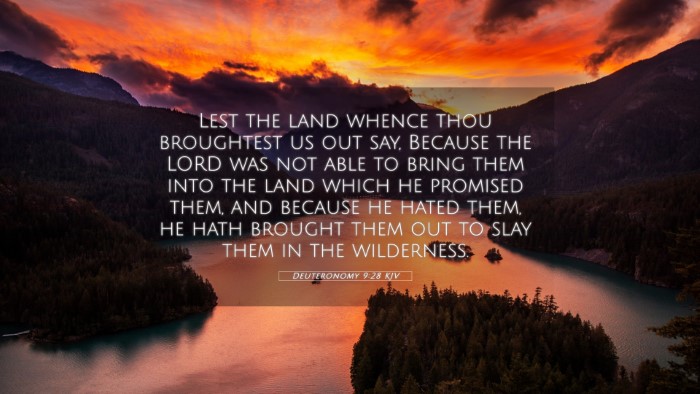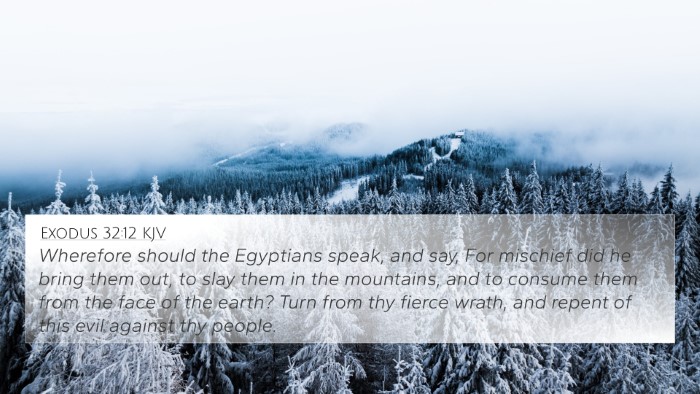Understanding Deuteronomy 9:28
Deuteronomy 9:28 states: "Else the land whence thou broughtest us out say, Because the Lord was not able to bring them into the land which he promised them, and because he hated them, he hath brought them out to slay them in the wilderness." This verse is part of a speech by Moses to the Israelites, addressing their disobedience and the eventual consequences that arise from their actions.
Contextual Background
In the broader context, Deuteronomy serves as a reminder of the covenant between God and His people as they prepare to enter the Promised Land. Moses emphasizes that their current struggles are a direct result of turning away from God’s commandments.
Commentary Insights
- Matthew Henry: Henry explains that this verse reflects the concern that if the Israelites fail to trust in God and enter the Promised Land, the surrounding nations will misunderstand God's intentions. They would wrongly believe that God lacked the power or desire to fulfill His promises.
- Albert Barnes: Barnes notes that this verse serves as a warning against the despair and distrust that can arise in the face of adversity. It highlights the importance of faithfulness to God’s promises, asserting that failure to do so could lead to disastrous interpretations of God's character by the nations around them.
- Adam Clarke: Clarke points out that the mention of 'the land' signifies the important inheritance that the Israelites may forfeit due to their rebellion. He stresses the gravity of forsaking their covenant with God and warns them of the repercussions that may lead others to question God's allegiance and power.
Thematic Connections
This verse illustrates critical themes found throughout the Bible regarding disobedience, God's faithfulness, and His reputation among nations. The implications of the Israelite's disobedience resonate deeply, especially when considering the interconnected narratives seen in various scripture references.
Cross References
To gain a better understanding of Deuteronomy 9:28, the following Bible verses serve as pertinent cross-references:
- Exodus 32:12: Discusses the potential misunderstandings of God’s inability to fulfill His promises.
- Numbers 14:14: Refers to the fear the Israelites experienced and the impact of their disbelief on others’ perceptions of God.
- Psalms 106:24-27: Highlights the people's rejection of the promised land and the consequences of their actions.
- Jeremiah 29:17: Warns against misrepresentations of God's plans and purposes for His people.
- Isaiah 63:10: Speaks of the consequences of grieving the Holy Spirit and how it leads to misunderstandings about God’s character.
- Romans 2:24: Discusses how God's name is blasphemed among the Gentiles due to the behavior of His people.
- Hebrews 3:19: Reflects on the disbelief of the Israelites and the ultimate consequence of their lack of faith in God's promises.
- 1 Corinthians 10:5: Provides a sober warning about the historical examples of Israel’s failures.
- Matthew 5:16: Encourages the idea that believers should act in a way that glorifies God, preventing any distressing interpretations of His nature.
- Philippians 2:15: Urges believers to shine as lights in a world that may misinterpret God's workings.
Conclusions
Deuteronomy 9:28 serves as a crucial reminder of the importance of faithfulness to God, not only for personal benefit but also for the integrity of God’s reputation among the nations. Through comprehensive Bible verse cross-references, we can see the deep interconnectivity of scripture which enriches our understanding not only of individual verses but the overarching narrative of the Bible. The verse encapsulates a pivotal moment reflecting the tension between divine promise, human action, and the resultant implications on how God is perceived across generations.
Tools for Further Study
For those looking to study further, using tools like a Bible concordance or a cross-reference Bible study guide can help identify essential themes and connections. Understanding the inter-Biblical dialogue can illuminate the continuity of God’s message throughout various books and authors, enhancing study depth and application.
Final Reflection
Reflecting on Deuteronomy 9:28 invites readers to consider not only their relationship with God but also how their actions and beliefs might contribute to the broader understanding of God in the world. Employing comprehensive Bible cross-reference materials can aid in drawing connections between scriptures, offering insights into God’s unwavering fidelity amidst human failure.




